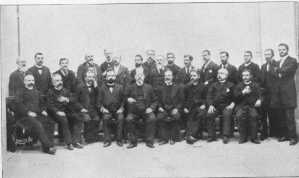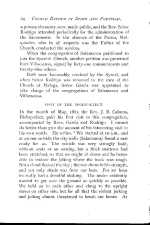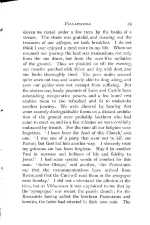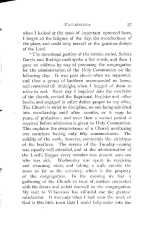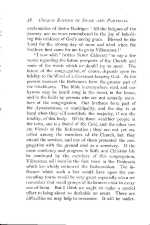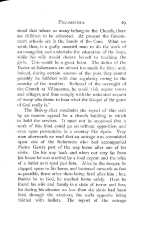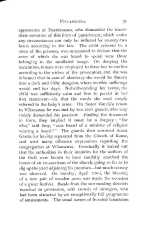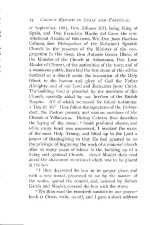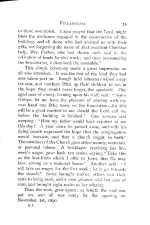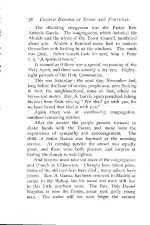

|
Chapter 2, VillaescusaAt this village the Reformed Spanish Church has a strong station, and as the story of the rise and progress of the work there is especially interesting, I am giving it at more length than space allows me to do so in other cases. Villaescusa is a town of about 300 families, situated in the province of Zamora, between the converging lines of the angle formed by the railways from Medina del Campo to Zamora and Salamanca respectively. All roads to the village are bad. During summer, when the ground is dry, one may ride ina vehicle strongly put together, but after the autumn rains commence, the saturated clayey soil soon clogs, and the journey can only be made by foot or on horseback. The campos around are destitute of trees, but the soil is fertile, and, despite very primitive methods of agriculture, yeilds plentiful crops of wheat, and of garbanzos aand other vegetables. The appearance of Villaescusa closely resembles that of many small towns found in old Castile, but the English traveller coming direct from the Northern Railway for the first time would probably be much surprised. The streets are narrow and rough, the pedestrian having to carefully pick his way to avoid stumbling. The houses af one floor are generally built of adobe - that is, of mud bricks mixed with straw, which have been dried in the sun. The narrow doors are so low that one has to bow his head to enter. There is no inn, nor is there a shop in the place, nor even a butcher's or chemist's. Every householder is a small landowner; he lives in his own dwelling, works his own fields, makes his own wine, bakes his own bread, and has his own pigs and fowls. Extras are supplied from the town of Fuentesauco once a week. The parish church is a miserable, unsightly edifice.The chief personages of the town are the priest, the alcalde, doctor, schoolmaster and schoolmistress. The people are descended from the ancient Goths, and from time immemorial have led an almost patirarchal existence, altogether undisturbed by the questions which have wrought such changes in the world outside them. There is not much which would attract the mere traveller to Villaescusa, but to one interested in the spread of the Everlasting Gospel, there is that to see and hear which would more than compensate for the toils of the journey. Here is a little congregation of Christians, who have thrown off the errors of the Church of Rome, and who flourish as an oasis amid the vast dry plains of leon and Castile, The following story will be found full of interest to all who sympathise with those who are struggling out of darkness into light. It is well known that for many years our great Bible and Tract Societies have been engaged in the distribution of the Holy Scriptures and tracts in Spain. To their work the beginnings of this movement are due. A young carpenter in Villaescusa, named Melquiades, in one of his visits to Fuentesauco, purchased a portion of the Bible. He was induced to do so more on account of its low price than anything else, for beyond the name he knew very little about it. On returning home he made no mention of his bargain -not for any particular reason- but now and then he would devote a portion of his time to its perusal. To his surprise, he found a detailed account of certain events in the life of Christ with which he was already perfectly acquainted, and of others which were altogether new. After a while he showed the book to his sister, read to her several portions which afforded great delight, and from that time they daily read the Word of God together. The young man regularly attended church where sermons were preached, carefully noted texts referred to by the priest, and on returning home he diligently studied the texts cited. By and by he had another object in view. He wished to compare the doctrines taught in the pulpit with those plainly set forth in the Book. This gradual but sure progress in knowledge confirmed some points of his belief, taught him matters of faith of which he had no previous conception, and opened up new views regarding the love, mercy, and grace of God revealed in Christ Jesus. At the same time it weakened his hold on certain doctrines he had learned in childhood, but of which he could find no mention in the inspired volume. Whether he or his sister made the greater advancement in Biblical study it is difficult to say, though each says the other had the advantage. Filled with joy at what they had learned, Melquiades and his sister began to tell their neighbours of the treasure they had found. The priest, hearing of this, called upon them and asked to see the book. After turning over the leaves he said, "This is not the real Bible. It is published by heretics, and worth little, though you obtained it for next to nothing. You must give it up to me. I positively forbid your reading it because of the risk you run of becoming a Protestant. Besides, our holy Mother Church forbids the reading of it." Upon hearing these and similar remarks, Melquiades replied, "The book cost me money. It is mine and I shall keep it. What I have read does not displease me. It has, the rather, taught me to be a better Christian. The texts I have heard you repeat in your sermons are here. Surely I may as well read them at home as hear them read from the pulpit. I do not know what you mean by being a heretic and a Protestant. This I know: that now I believe in Jesus Christ the Son of God with more understanding and in a different way than I used to do; and as I owe all this to the study of the book, I shall not cease to continue reading it." Failing in the object of his visit, the priest withdrew. The young man and his sister continued to read the book, and to discuss it with friends, though the latter responded with a measure of fear owing to the Curé's language. Sometime afterwards two friars sent by the Bishop of Zamora came to Villaescusa to preach a series of sermons upon the customary points of faith and morals. Melquiades listened attentively to every discourse, and on returning home compared the texts and doctrines he had heard with the words of his Bible. One day he was somewhat concerened to receive a notice to the effect that one of the preachers desired an interview with him. He did not hesitate, however, but taking up his Bible, went to the house where the friars were lodging. It would occupy too much space to narrate all that transpired, but the closing words of the ecclesiastic werre - "you may keep the book and read it if you choose. You appear to be well instructed in these matters. have faith, know what you read, and you will receive no harm. All I sak is - do not read the book to anyone else." On his way home the carpenter thought, "So i may keep the Bible, but I must not read it to anyone else! Shall I who once was so ignorant, but am now through God's mercy enlightened, keep this knowledge to myself, and allow my fellow-townsmen to perish in darkness? Ah! What they want is that we should have the blind faith they speak so much of in their sermons." His sister welcomed him home, and in answer to inquiries was told how the ecclesiastic had menaced him with excommunication first and condemnation afterwards; how they entered into controversy, and the arguments adduced by his opponent, based upon the infallibility of the Church and its indisputable authority; and how, when finally hemmed in by words of Scripture, the friar had given the consent as already stated. From that time the brother and sister began to study Holy Scripture more earnestly than ever, and with earnest prayer for heavenly wisdom. They spoke to their neighbours and friends; the people visited their house and looked forward to the Bible readings with gladness. As in all small places, nothing can remain long a secret, and when the friar's injunction leaked out, the Curé was greatly angered. The priest was alarmed at the progress of the movement, and in the pulpit solemnly declared his intention to ask the Pope to excommunicate any and all of his flock who should from this time meet to hear the Bible read, or anyone who should himself read it. The Curé's manner had the desired effect. Most who had visited the 'Bible-house' kept away. Some, however, wishing to show their contempt for the priest's threats, and others animated with a sincere desire to know the truth, continued to attend. It was a time of sadness, for the position was critical. What could such a few do when menaced by a priest who had such power over the bulk of their townsmen? They knew nothing of the sufferings endured for the Gospel's sake in other lands, nor of the glorious roll of Spanish martyrs who had laid down their lives rather than deny the lord who bought them. But they knew what Christ had endured for their sakes. They knew that He had laid down His life for them, and that it is enough for the disciple that 'he be as his Lord'. A deep sense of natural sinfulness and weakness kept them humble, yet they rejoiced in Christ Jesus and bore fruit to the praise of His name, praying meanwhile that their enemies might be led to know Him and the power of His grace. "It is no use inviting our townspeople to come to the readings," the young man remarked to his friends: "so long as a man's conscience is in the hands of a fellow-sinner he will remain in slavery. If we cannot bring the truth to their ears, let its effect be seen in our lives. let us strive to live to the glory of God. Let us abstain from the lusts of the flesh, the world, and the devil, and seek by God's grace to overcome those sins which often waylay us to our fall, that men may take knowledge of us that we have been with Jesus." This godly counsel met with approval. The Lord's day was better observed. Each sought to amend his life according to the teaching of the Word, and God owned and blessed the effort. They had to suffer many petty persecutions; the shafts of satire were often directed against them. But their forbearance was more potent than the arms of their enemies, and they remembered the words, "Wait on the Lord, be of good courage, and He shall strengthen thine heart." The leaders of the faithful few procured a number of Bibles from a distance and some tracts, and thus, without any outside help, a congregation was formed. In the course of time a passing colporteur visited the town, and subsequently an evangelist, and gave them much encouragement. But for a long time they were without a pastor, without the administration of the sacraments, and without knowledge of or fellowship with any of the congregations existing in Spain. The congregation at Villaescusa was not formed by any Pastor or evangelist sent by any society. The work spontaneously originated through the reading of the Word of God. Indeed, I may say here, that both in Spain and Portugal the work has been mainly the same in its origin, and it is a fact which should do much to strengthen our faith in the efficacy of the Word of God when carried home to the heart by the Holy Ghost, even when there is no preacher. When the brethren at Villaescusa learned that a congregation of reformers had been formed at Salamanca, they sent a commission inviting the Pastor to visit them. The Rev. Señor Rodrigo acceded to their request, saw the wondrous work of God among them, preached the Word, and in accordance with the wishes of all, undertook the spiritual oversight of the congregation. In May, 1880, a room was hired as a capilla (chapel). The services, which until now had been almost of a private character, were made public, and the Rev. Señor Rodrigo attended periodically for the administration of the Sacraments. In the absence of the Pastor, Melquiades, who in all respects was the Father of the Church, conducted the services. When the congregation of Salamanca petitioned to join the Spanish Church, another petition was presented from Villaescusa, signed by forty-one communicants and twenty-nine others. Both were favourably received by the Synod, and when Señor Rodrigo was removed to the care of the church at Málaga, Señor García was appointed to take charge of the congregations of Salamanca and Villaescusa. VISIT OF THE BISHOP-ELECT p.24 and following as jpeg scanned picture: Further chapters of this book may be added in the future. ... but we have been beaten! Read the rest on the Anglican Church History website. More about the history of the Reformed Episcopal church can be read in Spanish at this link. |
